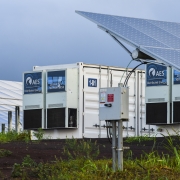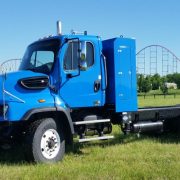written by Kansas City Regional Clean Cities Coalition director David Albrecht
Batteries are ancient, by today’s tech standards. Benjamin Franklin is the first person we know of to use the term, and the first published science on the topic dates to 1791. The days of metal disks stacked in brine are long gone (except in middle school science class). Lead-acid batteries in cars and golf carts are still common and will be for years, given their low cost. But the focus here is on the next generation of large-scale systems. And the question is how these batteries – bigger and more powerful than anything we’ve known – can redefine and remake the world’s electrical grid.
You’ve likely heard the expression “lightning in a bottle”. Storing electricity at industrial scale is very much like that. Electricity moves fast. In copper wire or other conductors, it’s traveling at somewhere between 50% and 99% of the speed of light. And in grid operations, it has to be sold – that is, used – as soon as it’s produced. If it isn’t, grid and utility engineers run the risk of power plants disconnecting, since they’re only designed to run in a very narrow range of conditions. What this next generation of battery tech provides is a way to store that electricity and in doing so provide a whole basket of benefits – financial, technical and environmental.
Arguably the biggest single benefit battery storage provides is the ability to capture electricity from renewable sources. Obviously, the wind doesn’t always blow. And even when it does, that’s an issue in itself. In February 2017, the Danes powered their entire country for 24 hours on windpower. But if a wind farm produces more power than needed, the system operator must start shutting down turbines or face overloading the grid. And while the sun defines “predictable”, solar plants only provide power for so many hours per day. Large-scale storage means that intermittent, low-cost, and environmentally-friendly electricity can be stored now and used later.
Having large amounts of electricity in storage and ready to go at a moment’s notice is a financial boost for power companies. It means that utilities can sell back low-cost power from renewables to meet peak demand; when power sells for far more than it cost to generate. It also means that utilities can meet their own demand spikes without having to pay the often-bruising high prices electricity markets produce at peak demand.
There’s more. Energy storage can improve the system’s operating reserve. Like energy, the grid is always moving – more demand here, less demand there, big storms and equipment failures now and again. It’s a dance that never stops. Engineers and analysts meet these constant changes with machines and data to keep the system balanced. But they are never 100% correct in predicting what will happen on any given day. Having stored reserve power that can be deployed in seconds boosts the operating reserve, and in doing so, boosts grid stability. Improving stability can mean lower infrastructure investment costs. It can also cut the costs of “black starts” when generators go down. Typically, they have to be restarted with diesel generators, but battery systems for just this purpose have already been successfully tested.
So, what do utility-scale batteries look like? Imagine shipping containers lined up in an electrical substation, or row after row of gigantic desktop computer towers. The Hornsdale Power Reserve, in South Australia, was designed and built by Tesla. It uses lithium-ion batteries (like in your computer) and provides 129 MWh of power – enough to supply all the electricity for about 3,500 homes for an hour. These projects sound large, though total deployments to date are tiny – globally about 6 GWh through 2018. But there’s one simple fact that you need to remember. In 2010, commercial battery packs cost about $1,100 per kilowatt-hour. By December 2019, that price had fallen to $156 per kilowatt-hour, a drop of 87% – and nearly 50% of that total decline came in the preceding three years. With costs set to break the $100 mark by as early as 2024, batteries are increasingly likely to be included in energy infrastructure and development for years to come.


